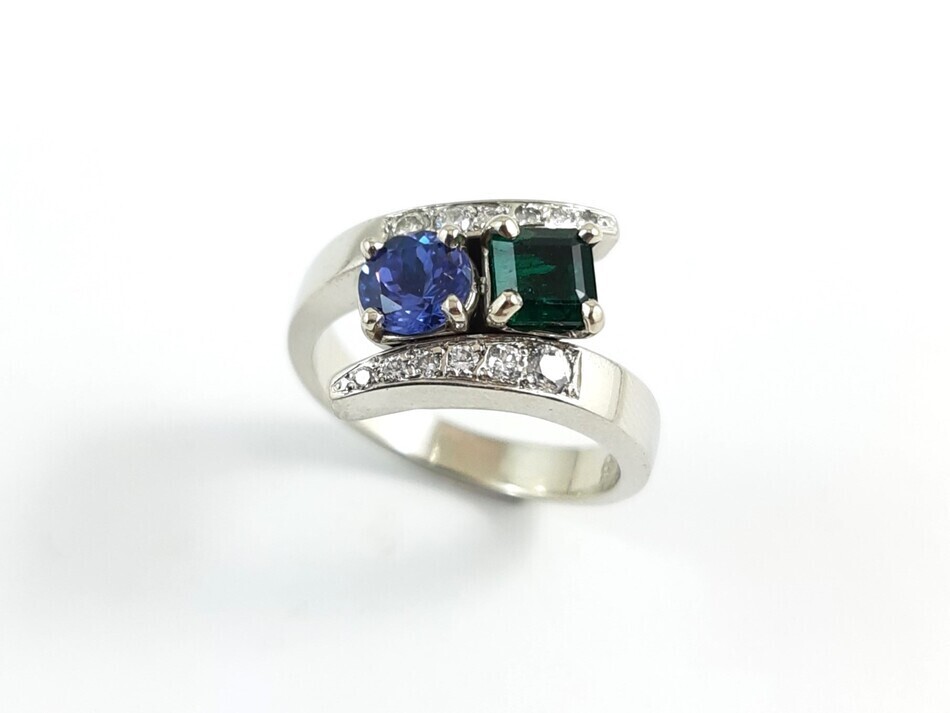Welcome back to The Bench Jewellery blog, where we continue our journey through the world of exquisite gemstones. After exploring the vibrant depths of blue zircon, we turn our attention to tanzanite, December’s other captivating birthstone. Known for its striking blue-violet hues, tanzanite is not only a symbol of December but also a gemstone with a unique and relatively recent discovery. In this feature, we’ll explore the fascinating aspects of tanzanite, from its discovery to its place in modern jewellery design.
What is Tanzanite?
Tanzanite is a rare, exotic gemstone found only in the Merelani Hills of Tanzania, from which it derives its name. It is a variety of the mineral zoisite and is famous for its remarkable blue and violet colours. This gemstone exhibits pleochroism, meaning it shows different colours when viewed from different directions – primarily blue, violet, and burgundy depending on the crystal orientation and lighting conditions.
The Only Source of Tanzanite
The exclusivity of tanzanite comes from its single-source origin. It is mined in a small area in Northern Tanzania, near the majestic Mount Kilimanjaro. This limited geographic origin makes tanzanite a thousand times rarer than diamonds.
A Modern Gemstone with a Brief History
Discovered in 1967 by a Maasai herdsman who noticed sparkling stones in the sunlight, tanzanite’s history is relatively short compared to other gemstones. Its global introduction and subsequent popularity are credited to Tiffany & Co., which recognized its potential and named it tanzanite to highlight its exclusive geographic origin.
Tanzanite has rapidly grown in popularity due to its unique colour and rarity. Its deep blue with violet undertones is highly sought after in jewellery, making it a favourite for engagement rings, necklaces, and other fine pieces. Its colour is also known to vary depending on the lighting, adding to its allure.
One of the most famous pieces of tanzanite jewellery is the “Queen of Kilimanjaro,” which is part of the Royal Ontario Museum’s collection. This remarkable piece features a large, 242-carat faceted tanzanite set in a white gold tiara, surrounded by 803 tsavorite garnets and 913 brilliant-cut diamonds.
Interesting Facts About Tanzanite
- Color Enhancement: Most tanzanite undergoes heat treatment to achieve its vibrant blue colour, a common practice in the gemstone industry.
- Limited Supply: With predictions of the mines running out in a few decades, tanzanite is becoming increasingly precious.
- Cultural Significance: For the Maasai people, tanzanite has come to symbolize new life and good fortune, often used in ceremonial wear and as gifts.
Tanzanite in Modern Jewellery Design
At The Bench Jewellery, we appreciate tanzanite’s unique beauty and versatility. Whether set in gold or platinum, its striking colour makes a statement in any piece. Our goldsmiths in Kamloops, Chilliwack, and Kelowna are adept at crafting jewellery that accentuates tanzanite’s unique charm, from classic settings to contemporary designs.
Conclusion
Tanzanite, with its exclusive origin and breathtaking colour, is more than just December’s birthstone. It represents both a geological rarity and a modern jewellery icon. Whether you’re looking to celebrate a December birthday, an engagement, or simply wish to own a piece of this rare gemstone, The Bench Jewellery is your destination for exquisite tanzanite pieces. Join us in celebrating the beauty and rarity of tanzanite.
Discover our Jewellery Design Services
We hope this glimpse into the world of tanzanite has inspired you. Keep an eye on our Resources page for more insights into the fascinating world of gemstones and jewellery, including an intro to birthstones and an exploration of the other December birthstones, blue zircon.

